|
Genres, Themes, Actors, and Directors:
- Character Studies
- Henpecked Husbands
- Housewives
- Joan Crawford Films
- Play Adaptations
- Wendell Corey Films
Review:
Harriet Craig is the third cinematic adaptation of George Kelly’s 1925 stage play Craig’s Wife — filmed first in 1928 by William C. de Mille, and then in 1936 by Dorothy Arzner — and is one of many vehicles in which Crawford essentially plays a version of herself. In this case, she’s a neurotic, manipulative woman who uses others for her own needs, and cares more about maintaining a perfect house than promoting the happiness of its inhabitants (anyone who’s read Christina Crawford’s memoir Mommie Dearest, or seen the movie version, will immediately recognize shades of Joan in Harriet). The story itself, unfortunately, is less convincing: while it’s hinted that Harriet’s sway over her husband (Corey is perfectly cast) is primarily sexual, it’s still tough to imagine that he would remain deluded about her pathological tendencies for so many years; and his shift from adoration to contempt is far too sudden. Similarly, Celia’s blind devotion to Harriet — despite whatever favors Harriet did for her years earlier — beggars belief; and Harriet’s desire for status and wealth is at odds with how desperately she tries to prevent her husband’s promotion. Despite its narrative flaws, however, Harriet Craig remains worth a look simply for its status as a prototypical Crawford flick.
Note: A more apt title for the film would perhaps be Harriet’s House — indeed, the house itself is a central character.
Redeeming Qualities and Moments:
- Joan Crawford as Harriet (check out the flame lapels)
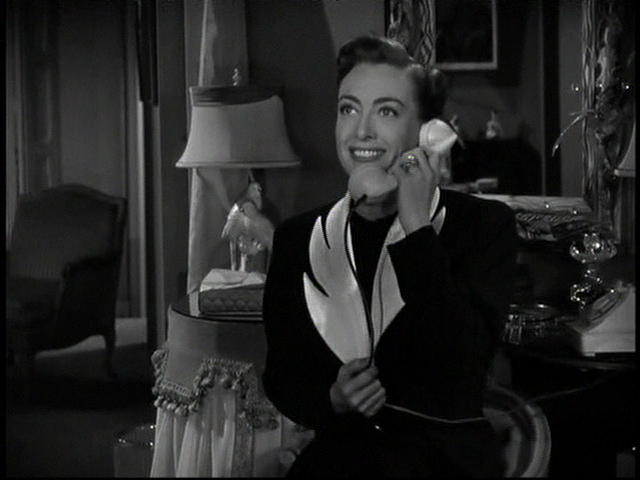
- Wendell Corey as Walter
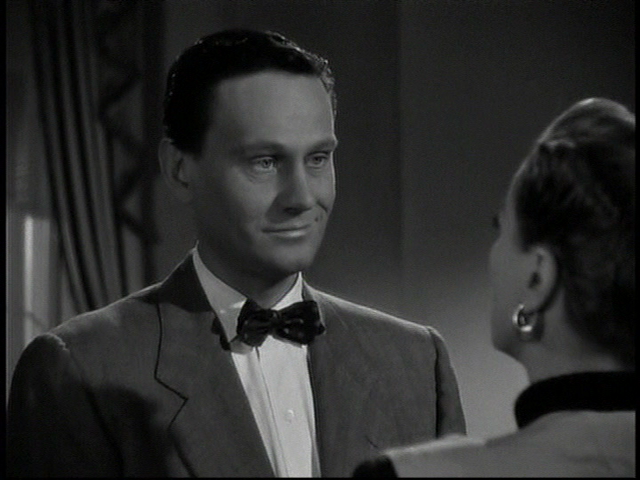
- Allyn Joslyn as Walter’s friend Billy
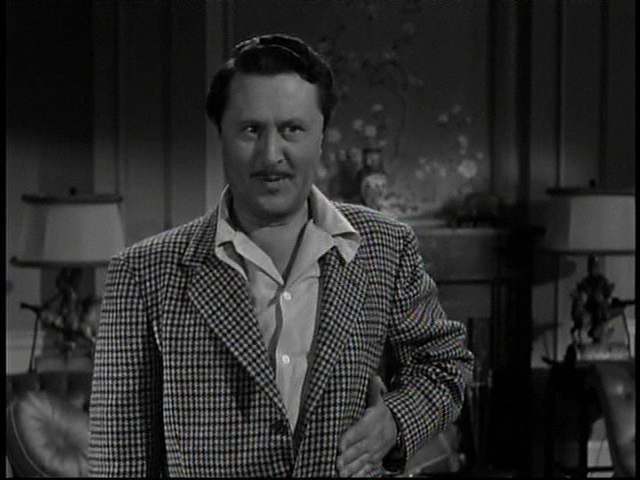
- A disturbing portrait of a housewife whose need for control jeopardizes her marriage
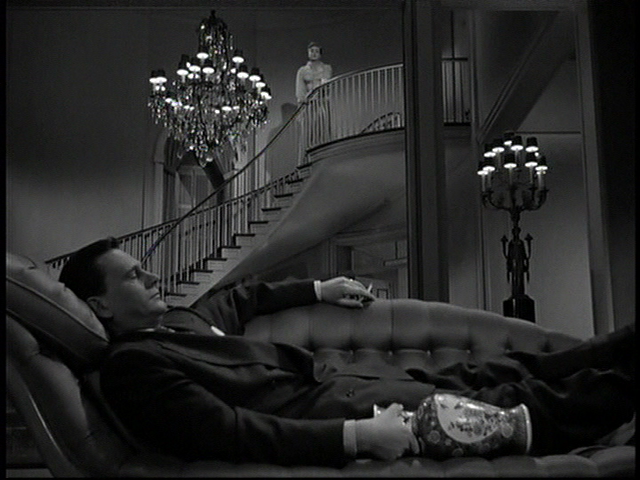
Must See?
No, but it’s certainly worth a look.
Links:
|
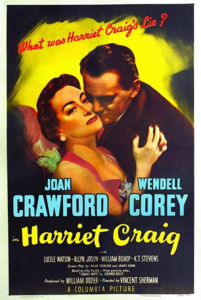




2 thoughts on “Harriet Craig (1950)”
A must – among the films I could probably watch anytime, and among those that reveal more through repeated viewings.
I agree that the film requires a certain amount of suspension of disbelief. That said, it plays amazingly well. It has a top-notch screenplay dripping with subtext; in fact, it’s a psychological smorgasbord.
Riveting throughout, ‘HC’ opens with a marvel of direction as Vincent Sherman establishes what almost amounts to taut suspense: three women are in a vortex of giving assistance to Joan Crawford’s character; two are on their last nerve and browbeaten while another is clearly biding her time until the house of cards she works in collapses. Before we even see Crawford, we know her Harriet is a supremely manipulative force to be reckoned with.
We soon learn that Harriet’s problems stem from a troubled past involving mom and dad but, whereas mom’s psychiatrist doesn’t feel mom’s escape to “an inner world” is the result of “a single cause”, Harriet clearly blames dad for everything – mostly for leaving. Harriet’s mother’s retreat into herself has resulted in a specific fear for Harriet. (There’s actually quite a bit going on in this sequence – but we’re left to fill in a number of blanks.)
Subsequently, Harriet states: “I don’t like the feeling of being rushed along in the darkness, having no control.” Although she’s on a train when she says this, we know that the real ‘darkness’ is the life of her own design, the carefully carved deception that will eventually slip from her control. It’s fascinating watching how that happens.
Although there are quite a few inadvertently funny lines along the way, I wouldn’t say ‘HC’ qualifies as one of Joan’s camp films; it’s ultimately too disturbing and compelling for that. (One of the unexplored, yet more intriguing elements is how Harriet manages to keep from getting pregnant, esp. considering that she’s able to have children, her husband wants them and, since Harriet is believed to be something of a powder keg sexually, the couple seems to have an unusually active sex life.)
Particularly powerful here are the countless non-verbal reactions from just about every character, including Harriet.
As it builds inexorably to its conclusion, this becomes one hypnotic film; one that could be the subject of a mesmerizing thesis paper.
Top Notch Crawford film, can you imagine any other actress in this role? Besides Wendell Corey I didn’t recognise any of the other actors but each gives a very convincing performance.
There wasn’t much evidence of this being a filmed play, the direction and especially the photography are top notch. As already explained, the opening scene immediately explains the type of woman we are dealing with, an insecure diva. Especially look out for the film-noir type of lighting, in certain scenes it’s just below Crawford’s eyes and sometimes it’s the eyes that get most of the light. Then the lighting through the blinds when Crawford enters a room gives the impression of a prison similar to the famous scene in the 1947 Nightmare Alley.
Finally this is the film that explains the difference between particular and peculiar, an example of the great dialogue.